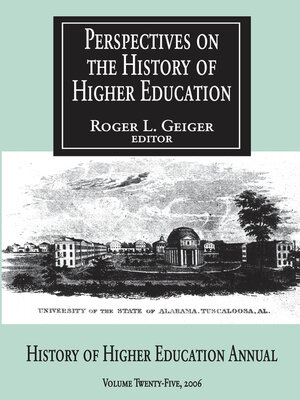
Sign up to save your library
With an OverDrive account, you can save your favorite libraries for at-a-glance information about availability. Find out more about OverDrive accounts.
Find this title in Libby, the library reading app by OverDrive.



Search for a digital library with this title
Title found at these libraries:
| Library Name | Distance |
|---|---|
| Loading... |
Volume Twenty-Five of Perspectives on the History of Higher Education, the silver anniversary edition, offers three fresh contributions to the understanding of American higher education in the nineteenth century and three historical perspectives on topics of contemporary concern.The divergent paths of antebellum colleges in the North and South have long been recognized. Stephen Tomlinson and Kevin Windham discuss Alva Woods, who moved from Calvinist New England to preside over the new University of Alabama. Woods personified the commitment to evangelical Protestantism and rigid student discipline that prevailed in northern colleges of that era, but in Tuscaloosa confronted the sons of planters, raised to respect mainly independence, power, and the Southern code of honor. Adam Nelson considers geology, a crucially important science in early America that existed on the periphery of higher education but eventually exerted pressure for intellectual modernization. He portrays the small community of scientific pioneers who sought the latest scientific knowledge from Europe, surveyed the mineral wealth of American states, and advocated for science in the college curriculum.Beginning in the 1930s, the National Research Council waged an organized campaign to encourage academic patenting and centralize it within one organization. Jane Robbins explains the crosscurrents of interests that plagued and eventually scuttled that effort, but that set the stage for the contemporary practice of university patenting. Robert Hampel examines how, for more than four decades, students at Yale University took a major responsibility for learning into their own hands by publishing a Critique of courses. He analyzes these documents to determine if their aims were to identify easy or challenging offerings, and finds that this effort produced highly responsible articles.







